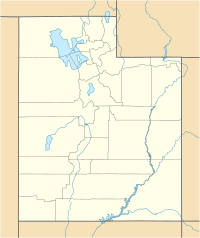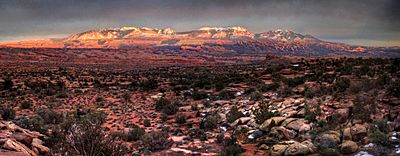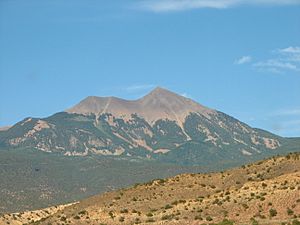La Sal Mountains facts for kids
Quick facts for kids La Sal Mountains |
|
|---|---|
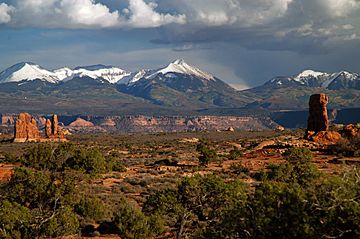
La Sal Mountains as seen from Arches National Park
|
|
| Highest point | |
| Peak | Mount Peale |
| Elevation | 12,721 ft (3,877 m) |
| Geography | |
| Country | United States |
| State | Utah |
| Range coordinates | 38°26′56″N 109°14′28″W / 38.44889°N 109.24111°W |
| Parent range | Rocky Mountains |
The La Sal Mountains or La Sal Range is a group of mountains located in Grand and San Juan counties in the U.S. state of Utah. They are found near the border with Colorado. These mountains stand tall above and to the southeast of Moab and north of the town of La Sal.
The La Sal Mountains are part of the Manti-La Sal National Forest and the southern Rocky Mountains. The highest point in the range is Mount Peale, which reaches 12,721 feet (3,877 m) above sea level. The range has three groups of peaks, separated by passes. The peaks stretch for about 10 miles (16 km). The name "La Sal" comes from Spanish times. The Sierra La Sal (meaning "Salt Mountains") was an important landmark on the Old Spanish Trail, a trade route between Santa Fe and Los Angeles.
How the La Sal Mountains Formed
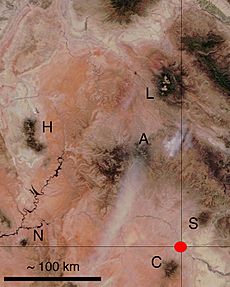
The La Sal Mountains were formed when hot, melted rock, called magma, pushed up from deep inside the Earth. This magma then cooled and hardened into igneous rock. Over time, the softer rocks around these hard igneous rocks wore away, leaving the tough mountain peaks standing tall.
Most of the igneous rocks here are a type called diorite or trachyte. They have visible crystals of minerals like hornblende and plagioclase. Some other rocks, like syenite, are also found. Some of these rock pushes formed dome-like shapes called laccoliths. These igneous rocks formed about 25 to 28 million years ago. The hot magma pushed into older sedimentary rocks that were formed during the Permian to Cretaceous periods.
The La Sal Mountains rise high above the surrounding Colorado Plateau. Two other mountain ranges on the Plateau, the Abajo Mountains and the Henry Mountains, formed in a similar way around the same time. Other nearby ranges, like the Carrizo Mountains and Ute Mountain, formed from similar rock pushes about 70 million years ago. Scientists are very interested in why these hot rocks formed in two different time periods in this stable area of the Earth's crust.
Important Peaks of the La Sal Mountains
The La Sal Mountains are home to several significant peaks. Here are some of the tallest ones:
| peak name | feet/meter |
|---|---|
| Mount Peale | 12,721 feet (3,877 m) |
| Mount Mellenthin | 12,645 feet (3,854 m) |
| Mount Tukuhnikivatz | 12,482 feet (3,805 m) |
| Mount Waas | 12,331 feet (3,758 m) |
| Manns Peak | 12,272 feet (3,741 m) |
| Mount Laurel | 12,271 feet (3,740 m) |
| Mount Tomasaki | 12,239 feet (3,730 m) |
| Pilot Mountain | 12,200 feet (3,719 m) |
| Green Mountain | 12,163 feet (3,707 m) |
| Little Tuk | 12,048 feet (3,672 m) |
| Castle Peak | 12,044 feet (3,671 m) |
| La Sal Peak | 12,001 feet (3,658 m) |
See also
 In Spanish: Sierra de La Sal (Colorado) para niños
In Spanish: Sierra de La Sal (Colorado) para niños
 | Sharif Bey |
 | Hale Woodruff |
 | Richmond Barthé |
 | Purvis Young |


